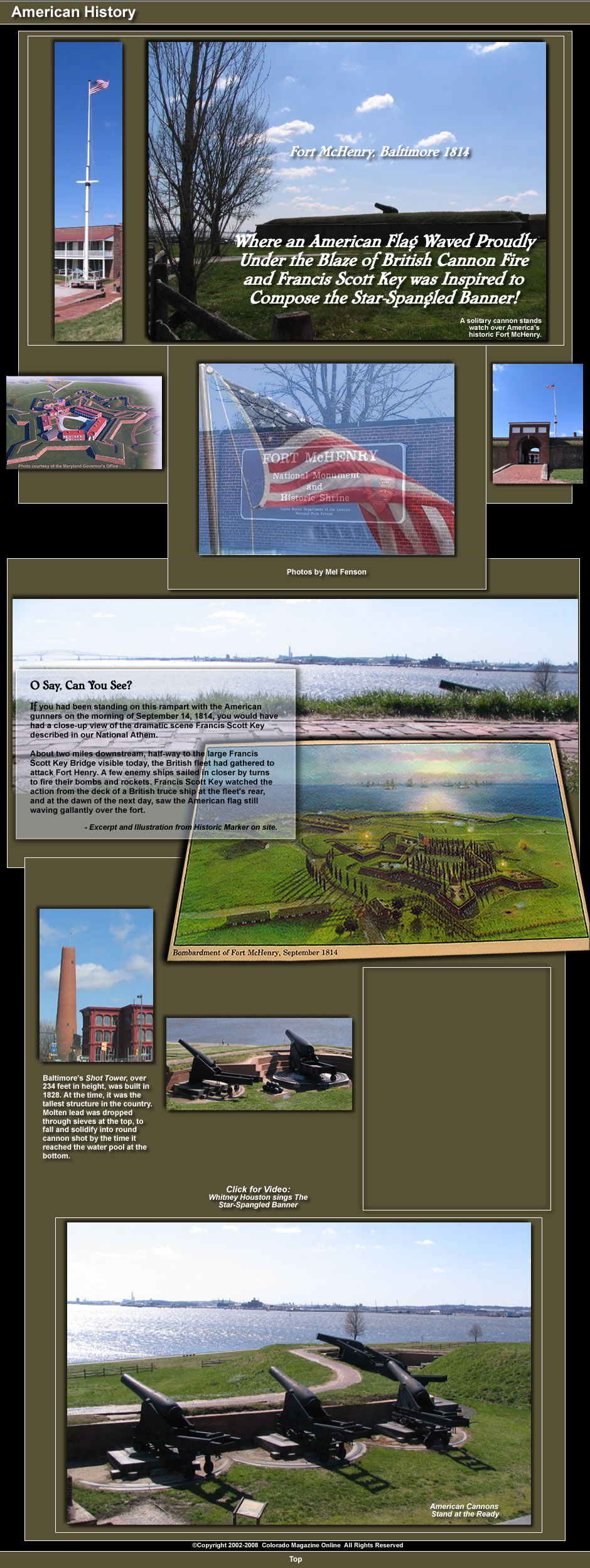

On Sept. 13, 1814, Francis Scott Key had visited the British fleet in Chesapeake Bay to negotiate the release of Dr. William Beanes, who had been captured after the burning of Washington, DC. His release was secured, but Key was detained on the ship overnight, during the shelling of Fort McHenry. The next morning, he was so delighted to see the American flag still flying over the fort that he began a poem to commemorate the occasion. The poem was later set to the tune of a popular drinking song for the Anacreontic Society, a London social club. Titled "The Anacreontic Song" it is thought to have been written by John Stafford Smith, a British composer. Renamed, "The Star-Spangled Banner," it soon became a well-known American patriotic song.
Already adopted for use by the Navy and the Army, the song was officially named the U.S. National Anthem, when a congressional resolution was passed on March 3, 1931 and signed by President Herbert Hoover.
The earth-walled, star-shaped Fort McHenry, which was surrounded on three sides by water, was built between 1794 and 1803 to defend Baltimore and its harbor from attack. The fort was planned by Jean Foncin, a French Engineer, and named after James McHenry, Secretary of War under George Washington, who was instrumental in its construction. Following the Battle of Baltimore, Fort McHenry never again came under enemy attack. However, it remained an active military post on-and-off over the the years, until it became a National Park in 1925. It is now a National Monument and Historic Shrine, managed by the National Park Service.
www.nps.gov/
______________________________
Oh, say can you see by the dawn's early
light
What so proudly we hailed at the twilight's last gleaming?
Whose broad stripes and bright stars thru the perilous fight,
O'er the ramparts we watched were so gallantly streaming?
And the rocket's red glare, the bombs bursting in air,
Gave proof through the night that our flag was still there.
Oh, say does that star-spangled banner yet wave
O'er the land of the free and the home of the brave?
On
the shore, dimly seen through the mists of the deep,
Where the foe's haughty host in dread silence reposes,
What is that which the breeze, o'er the towering steep,
As it fitfully blows, half conceals, half discloses?
Now it catches the gleam of the morning's first beam,
In full glory reflected now shines in the stream:
'Tis the star-spangled banner! Oh long may it wave
O'er the land of the free and the home of the brave!
And
where is that band who so vauntingly swore
That the havoc of war and the battle's confusion,
A home and a country should leave us no more!
Their blood has washed out their foul footsteps' pollution.
No refuge could save the hireling and slave
From the terror of flight, or the gloom of the grave:
And the star-spangled banner in triumph doth wave
O'er the land of the free and the home of the brave!
Oh!
thus be it ever, when freemen shall stand
Between their loved home and the war's desolation!
Blest with victory and peace, may the heav'n rescued land
Praise the Power that hath made and preserved us a nation.
Then conquer we must, when our cause it is just,
And this be our motto: "In God is our trust."
And the star-spangled banner in triumph shall wave
O'er the land of the free and the home of the brave!
 |
|